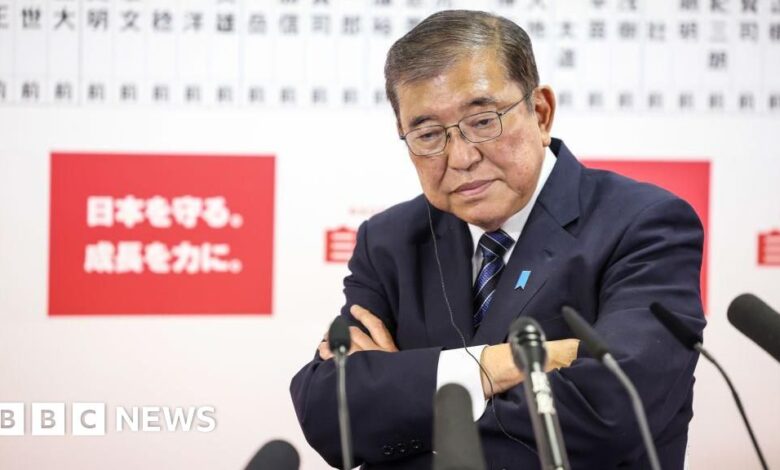The Japanese Prime Minister vowed to continue ruling despite heavy losses

Japanese Prime Minister Shigeru Ishiba vowed to continue leading the country despite the heavy defeat his party suffered in the general election.
The country now faces an uncertain political future as the coalition led by the long-ruling Liberal Democratic Party (LDP) lost its majority in parliament, its worst result in more than a year. decade.
Ishiba was sworn in as prime minister just this month after winning the leadership of his party. He called a snap election to complete his mandate.
However, in his speech on Monday, he admitted the LDP had received a “stern assessment” from voters and added that his party would “humbly accept” this.
“The Japanese people expressed a strong desire for the LDP to reflect and become a party that acts in accordance with the will of the people,” Mr. Ishiba told national broadcaster NHK.
The LDP and much smaller coalition partner Komeito won a total of 215 seats, short of the 233-seat majority needed to govern.
This is the first time the LDP has lost its parliamentary majority since 2009. The party has ruled Japan almost continuously since 1955.
The results come after a tumultuous few years for the LDP, which saw a series of scandals, widespread voter apathy and record low approval ratings.
The party had an approval rating below 20% at the start of the year, following a political fundraising corruption scandal.
Ishiba on Monday pledged to “enact fundamental reforms regarding money and politics”.
“We need to answer people’s criticism. That’s how I will take responsibility for the election defeat,” he said.
He also promised to revive rural Japan and tackle inflation.
Japan’s parliament now has 30 days to convene and choose a prime minister. The Prime Minister’s chosen party or coalition will form a government and can do so even without a majority of seats.
Ishiba said there are no plans to expand his political alliance at this stage. This increases the likelihood that he will retain the prime ministership and that his coalition will continue to rule Japan without a majority. But that also means they will no longer have the power to unilaterally pass laws.
Another possibility is for opposition parties to unite to form a government – the largest party is the Constitutional Democratic Party (CDP), which won 148 seats, up from 98 previously.
But that is a more unlikely scenario because opposition parties in Japan have historically had difficulty uniting or convincing voters that they are a viable option for power.
The CDP had an approval rating of just 6.6% before parliament was dissolved.
Politics in Japan has been evolving at a rapid pace in recent months.
Ishiba took over the country’s leadership earlier this month following a party election held after his predecessor Fumio Kishida – who has held the post since 2021 – made the surprise decision to step down in August. .
The move to call elections comes at a time when the LDP is trying to restore its tarnished image among the public.
Chief among the series of scandals that have dogged the LDP is the party’s relationship with the controversial Unification Church, described by critics as a “cult,” and the extent of its influence over the lawmakers.
Then came the revelations of the slush fund scandal, with dozens of LDP lawmakers accused of pocketing proceeds from political fundraising events.
Those charges, which cost millions of dollars, led to the disintegration of powerful factions.
Additional reporting by Chika Nakayama




